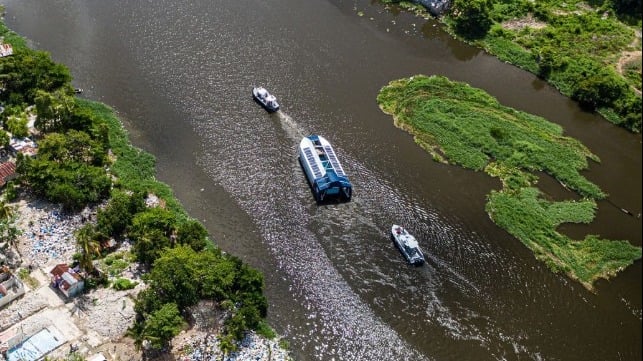Coca-Cola Joins The Ocean Cleanup in Tackling Ocean Plastic Pollution

As part of the effort to stem the tide of plastic pollution entering the world’s oceans, the Coca-Cola Company is joining with The Ocean Cleanup to expedite the deployment of cleanup systems in fifteen rivers around the world. The partnership is part of the Dutch non-profit foundation’s efforts to stop plastic pollution by capturing it before it enters the world’s oceans.
Through the partnership, The Ocean Cleanup, together with Coca-Cola, will implement the foundation’s technology know as the Inceptor in fifteen rivers by the end of 2022. Two Interceptors included in the partnership have already been installed in Santo Domingo, the Dominican Republic, and Can Tho, Vietnam. For these rivers, the partnership will help provide support in the development of waste management solutions for collected trash.
The organizations plan to extend the footprint of the Inceptor project across thirteen additional rivers in the next 18 months. In addition, they also hope to engage and mobilize both industry and individuals around the world to address plastic pollution, by eliminating plastic waste entering the world’s oceans and supporting ecosystems and water resources.
“The Ocean Cleanup’s mission is to rid the oceans of plastic,” said Boyan Slat, Founder and CEO, The Ocean Cleanup. “With 1000 rivers emitting nearly 80 percent of river-carried plastic into oceans, this massive problem grows by the day, which is why we are always looking to accelerate our progress. Among the waste we collect with our cleanup systems, we find many plastic bottles, including Coca-Cola packaging, so I applaud them for being the first in the industry to join our mission, as part of their wider actions to make a positive impact on worldwide plastic pollution. Our clear intent is to take our learnings from this partnership, which has the potential to evolve in the future and continue to scale rapidly. That’s why I believe this is good news for our oceans.”
The foundation’s Interceptor was unveiled in 2019 and is the first scalable solution to prevent plastic from entering the world’s oceans from rivers. It is solar-powered, extracts trash autonomously, and?is capable of operating in the majority of the world’s most polluting rivers.
The partnership will provide support for the local community engagements needed to deploy new Interceptors, as well as in the subsequent processing of the collected plastic via waste management expertise. The Ocean Cleanup and Coca-Cola will work together to secure the new partners and investment needed to continue to scale the enterprise through the roll-out of additional Interceptor solutions, as well as to secure licensing support and deploy River Monitoring System (RMS) cameras to conduct further analysis of river pollution.

that matters most
Get the latest maritime news delivered to your inbox daily.
Brian Smith, President and Chief Operating Officer, The Coca-Cola Company, said: “The Ocean Cleanup has a clear vision and proven technologies to support its goal to rid the world’s oceans of plastic. At Coca-Cola, we have teams on the ground who will support the deployment of new Interceptors in rivers around the world, as well as the processing and recycling of the waste collected. Working together, we believe we can have real impact. That’s exciting: it’s something we know our employees in every corner of the world will get behind, by helping to support the local implementation work and as ambassadors for the wider mission.”
According to The Ocean Cleanup, tackling plastic waste will require action and thinking from the best and the brightest, including civil society, industry peers, and the public sector. Accordingly, The Coca-Cola Company has helped to establish or has joined global partnerships that will help to realize the vision for a World Without Waste. The collective goal is to encourage more people to recycle and reuse and more organizations to invest in the circular economy, in which products and materials at the end of their useful life retain their value and are returned to the manufacturing process as part of a closed-loop in which little, if anything, is wasted.
